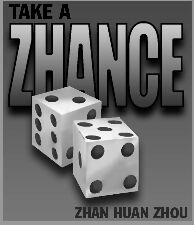
Spring 2000
Fall 1999
Winter 1999
Fall 1998
Spring 1998
Fall 1997
©2000 Zhan Huan Zhou
Updated Sep-01-2000
Please email me for comments, corrections, or suggestions.
How Many Habits?!?
©2000 Zhan Huan Zhou, Spring 2000, Issue 2
This past work term I picked up a book from the library that I had been meaning to read for quite some time. It was a quite a popular book and often parodied, even in "The Simpsons." I wasn't exactly sure what the book was about but I had a vague idea that it would help me become more effective. As I sat down and started reading, I realized that I was in for more than I had bargained for. It wasn't just planning my day more efficiently, it was deeper, much more fundamental. It was about fundamental principles and character ethic. The book was "The 7 Habits of Highly Effective People" by Stephen R. Covey.
It would be very impossible and a gross injustice to try and summarize all the points described by Covey in "Habits, " but I will bring up some key points that can help you in school, work, and everyday life with friends and enemies.
The most fundamental concept of the 7 habits is that in order to be an effective interdependent person, one must first achieve independence. The three habits associated with achieving independence are: be proactive, begin with the end in mind, and put first things first. The next three habits deal with interdependence: think win/win, seek first to understand then be understood, and synergize. The seventh habit known as "sharpen the saw" aims at continually enhancing your prowess in the first six habits. At first you might think these sound cheesy, but after reading the book and having experienced the effects of the seven habits, I am convinced that they can help anyone.
The key concept of the book is the "principle-centred paradigm." These principles are the axioms of human behaviour such as fairness, integrity, and honesty. Violating these principles severely jeopardizes our independence and certainly eliminates all interdependence.
Consider a fictional bank account where one can deposit fairness, integrity, or honesty. When you treat someone with fairly, you make a deposit into your "emotional" bank account. When treating someone unfairly, you make a withdrawal from the account. It should be evident that deposits can only be made in small amounts while withdrawals can be of unlimited size. An over-withdrawn bank account is the cause of many sour relationships. There is no trust between the two parties and it is very difficult to get anything done. A healthy bank account is the key to a healthy relationship. In these examples, a relationship can refer to romantic, friendship, office, or between two corporations. The same rules apply to all interdependent situations.
The other key point is maintaining the "P/PC balance." P is production for the short term and PC is production capability for the long run. For example, the CEO of a small start-up in Silicon Valley may drive their workers to work long hours to meet deadlines. This might increase production in the employees temporarily, but severely hampers PC. The workers get fed up and become less productive, perhaps even quit. Was the ability to meet those deadlines worth the price paid of losing valuable employees? Without employees, there can be no company. Covey describes this practice as "hacking at the leaves, not the root." The CEO must do something fundamentally different if he wants happy workers, meet deadlines, and the company to thrive in the future. Quick fixes only cover the wound, it doesn't heal it. Described in a different way that relates more the students, we can increase PC by studying a little bit during the term instead of cramming at the end. Not only will your marks be better but you will have a greater understanding of the material and you may even be able to apply your knowledge in a co-op work term. Cramming is a quick fix that gets you past the term, but doesn't really contribute to your overall education.
I hope that you can apply some of what I have said to some past, present, or future situation you encounter. Now if you'll excuse me, I have to go and sharpen my saw.